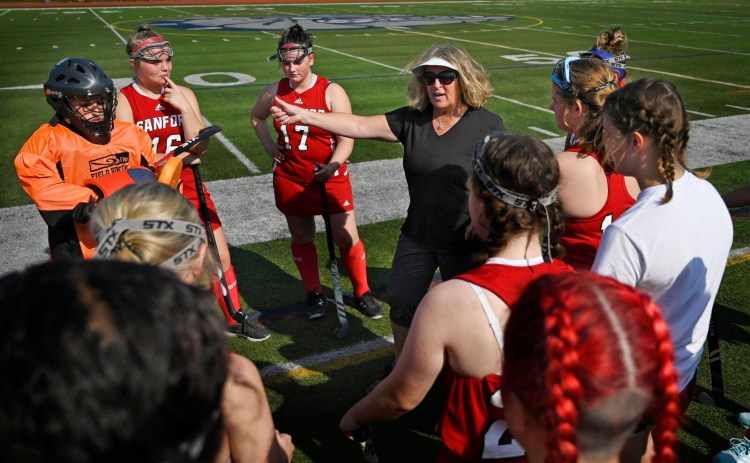Diana Walker never played field hockey in high school, at Thornton Academy in Saco, nor did she play in college, at Plymouth State in New Hampshire.
So how did she become one of the most successful high school field hockey coaches in Maine history?
“I went to lots of clinics, listened to lots of different coaches, observed,” she said Friday. “I tried things and just tried to make it fun. That was the main thing. I made them work hard, but I tried to make it fun.”
Walker announced this week that this season will be her last. She has nearly 400 victories, two Class A state championships (1999, 2000), two more regional championships (2001, 2007) and once compiled a 50-game winning streak.
She will turn 65 in March and also plans to retire from teaching.
“It’s a good time to stop coaching,” Walker said during a break in the SMAA’s field hockey Play Day at Portland’s Fitzpatrick Stadium. “We (she and husband, Steve Walker) plan to spend time with our grandchildren and travel.”
Her impact on Sanford has extended far beyond the playing field, according to Athletic Director Gordie Salls. She has been a physical education and health teacher at the high school.
“I don’t know how you measure all the positive things she did for the kids, not just on the field but in the classroom,” he said. “She’s obviously been successful over a long period of time. She’s been involved with the sport at so many levels and she’s been a good steward and mentor for a lot of coaches and kids.”
She certainly has had an impact on her coaching peers in the SMAA. Scarborough’s Kerry Mariello called her “an icon.”
“I mean, when you say the words ‘field hockey’ in Maine, certain coaches come to mind,” said Mariello. “She’s on that list. She’s always been a part of (travel) club programming, and that helped, especially in York County, which was a little behind. She’s been a constant when it comes to giving to the sport.”
Walker never thought she’d be the Sanford coach for 39 years. Asked what kept her going, she said, “The kids. I love my job, it’s a great job. And now I’m getting kids’ kids on my teams, so that’s interesting.”
Walker had her share of great teams in Sanford, with the group that won 50 consecutive games from 1999-2001 certainly at the top. “That was a great group of kids,” she said. “Those kids were just so self-motivating. They worked hard.”
But she is most gratified by seeing the impact that sport has had on her players.
“Just seeing the kids go on to play in college, to go into coaching,” she said, noting that Marcia Wood at Freeport played for her.
Walker said the sport is so much better today than it was when she started. Rule changes over the years – eliminating offsides, the self-start – have made the game faster and better, and players are simply more skilled than ever. “The kids just do things with the stick that I never dreamed of,” she said.
But she doesn’t see the same commitment overall in today’s athletes. “There’s just so many other things that kids have going on outside of school that’s tearing kids away from sports, whether it’s work or family situations,” she said. “COVID didn’t help, but that’s not the main thing. … It’s happening all over the place. Sports just aren’t the No. 1 thing for kids.”
She notes that her program this year includes only 22 players and that the Spartans will have to get creative to play junior varsity games. In the past, she said, “we had freshman teams where we had to make cuts.”
LIKE ALL SPORTS in Maine, field hockey is experiencing a shortage of game officials. According to Sue Weatherbie, the assigner for field hockey games, the Western Maine Board of Field Hockey Officials is down about 12 officials from the 2019 season.
She said they brought in five new officials this year, but they will all have to start at the middle school level.
“It’s a little difficult,” said Weatherbie. “Right now, I’ve assigned games through the month of September. So I think we’ll be OK.”
Weatherbie said the Western Maine board is working closely with the Central Maine board to make sure it can fill its schedule.
LAST YEAR’S ABBREVIATED fall season, in which some teams managed only two games while others played up to 10, certainly had its merits, according to the coaches. The biggest, they seemed to agree, was a renewed love for the game.
Robin Haley, the coach at Falmouth, said because this is the first preseason since 2019, much time is being spent “dusting off the cobwebs.”
But the players are grateful to be on the field.
“I think it’s that appreciation of being together, just celebrating being together,” said Haley. “Even though COVID is still around and the delta variant is in the back of our minds, there is a little bit of a comfort level that we’re here and we’re enjoying it and not, ‘Uh oh, let’s hope it’s not going to end today.’ That’s what we were living with a lot last year. That’s not to say that’s not the case now. We don’t know.
“But it’s about taking advantage of the moment and focusing on the now.”
Send questions/comments to the editors.



